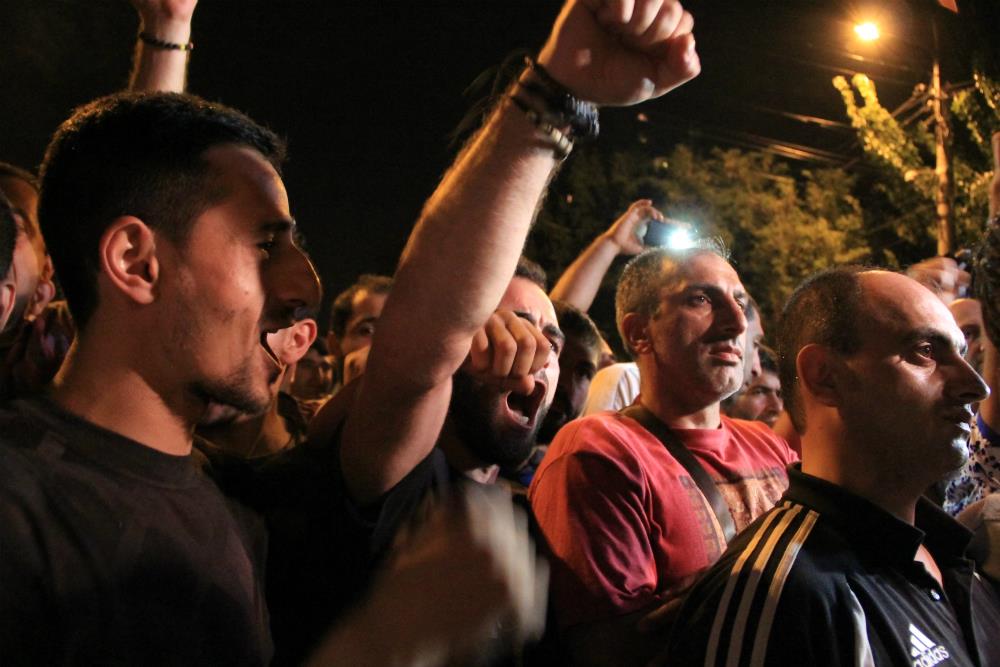The struggle of ‘Possessed from Sasun’
The story of the seizure of the police station began on July 17, and now the story is acquiring some more mysterious details. Analysts shy away from figuring out the ‘organizing party’ and the real goals of the seizure, which, according to its authors – the Sasna Tsrer group (Possessed from Sasun), is based on the need for systematic reforms in Armenia and the resignation of Serzh Sargsyan.
The coordination board, which was spontaneously set up on Khorenatsi street, adjacent to the seized patrol police department, is organizing public marches across the city, putting forward mostly humanitarian demands: not to storm the patrol police station and to provide the rebels with food and medicine. There haven’t been any proposals so far to march towards 26 Baghramyan street [the President’s residence is located there], where the president’s resignation may be demanded.
Many demonstrators are protesting: ‘Why do you lead us to and fro?’ But the point is that there are no leaders or representatives of the political forces outside the police department, who could mobilize the people and make them join the rebels in their demands.
However, as far as the political forces’ support for the rebels is concerned, the situation as it is unfolding is really interesting: only two Armenian parties, the “Alliance and the “Union, have officially announced that they will join the rally on Khorenatsi street.
The “Alliance”, set up by MP Tigran Urihanyan from the remnants of the “Prosperous Armenia” party, is clearly pro-Russian orientated and supports Armenia’s development on the Eurasian path. On the contrary, the “Unity” party, founded by ex-Foreign Minister Vartan Oskanian, is regarded as a possible political platform of the second President, Robert Kocharyan.
The fact that these parties support the rebels’ demands, as well as some other factors involved, suggest that the uprising is within the scope of interest of the pro-Russian forces, as well as of those loyal to Robert Kocharyan.

The uprising in Yerevan has a geopolitical context, though it isn’t obvious as of yet. Who is going to benefit if the situation becomes more aggravated in Armenia? Some experts believe that it is, first of all, beneficial for Russia, which is trying to push forward the so-called ‘Lavrov’s plan’ on the Karabakh resolution.
This plan provides for territorial concessions from Armenia and exascerbates the resentment within political forces. It is believed that the uprising was an attempt to disrupt ‘Lavrov’s plan’. Matthew Bryza, former Co-chair of the OSCE Minsk Group and the USA’s ex-envoy to Azerbaijan, also hinted at this. He said the uprising caused the resolution process to be postponed, agreed upon in St. Petersburg between the presidents of Armenia and Azerbaijan, along with Russian mediation.
At the same time, the Russian media has published some analytical arguments, ‘proving’ that the uprising was the western special services’ ‘handiwork’. “How Armenia is being shoved into the throat of a boa constrictor that is NATO- the Russian articles are published with these kinds of headlines.
There is the opinion that the Karabakh problem will be only a small portion of the changes in the region and that there is an outright struggle for the region between the West, on one side, and Russia and Turkey, on the other side.
In particular, the possible opening of the Armenian-Turkish border is a matter of importance, as well as commencing communication from the Persian Gulf to the Black Sea, through Armenia and Georgia. These changes will open up the region, and, depending on who will be ‘the sponsor’ of this, the region will be a ‘zone of influence’ for either the West or Russia.
Analysts stress the important role of Armenia in these plans, and, from this point of view the uprising could be a plan for destabilization in order to instigate change in the region.
In light of the recent developments in the seized police department, has there been any domestic or foreign policy or any important tasks being accomplished? No one has answer to this question so far, especially as it is difficult to predict the outcome of the ongoing developments. Nobody knows what other steps the rebels have planned and what the extent of destabilization in the region will be.
Published: 28.07.2016




















